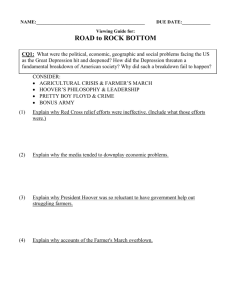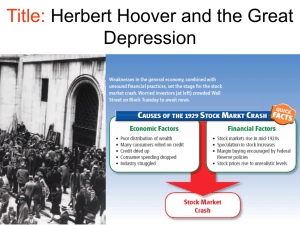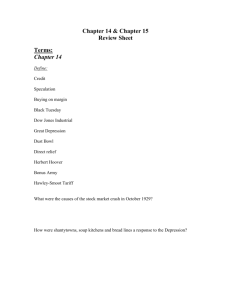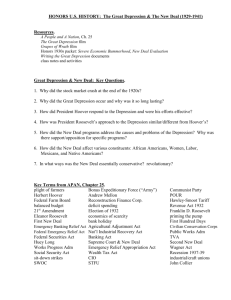Depression in the City
advertisement
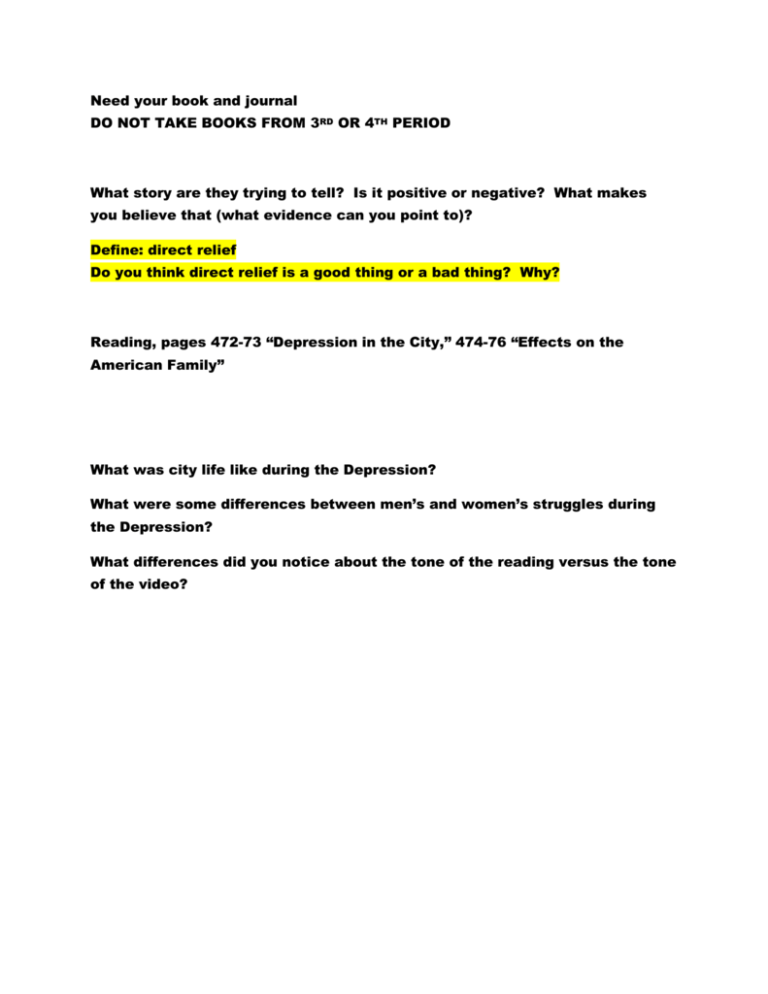
Need your book and journal DO NOT TAKE BOOKS FROM 3RD OR 4TH PERIOD What story are they trying to tell? Is it positive or negative? What makes you believe that (what evidence can you point to)? Define: direct relief Do you think direct relief is a good thing or a bad thing? Why? Reading, pages 472-73 “Depression in the City,” 474-76 “Effects on the American Family” What was city life like during the Depression? What were some differences between men’s and women’s struggles during the Depression? What differences did you notice about the tone of the reading versus the tone of the video? 1. Take formative quiz – no grade, don’t stress… this is just to let me know what you have learned. 1. Name one cause of the Great Depression (do not say Stock Market Crash). 2. Define “buying on margin” and connect it to the Great Depression. 3. Define “speculation” and connect it to the Great Depression. 4. Define “direct relief” and connect it to the Great Depression. 5. Give one word to describe how the Depression made Americans feel. 6. Explain how MEN faced the hardship of the Great Depression. 7. Explain how WOMEN faced the hardship of the Great Depression. 2. Watch Hamlet the Mini Pig Goes Down the Stairs 3. Reading on Hoover: p. 478-483 Need scratch sheet of paper and writing instrument, as well as book for end of period. Reading on Hoover: p. 478-483 Need: journal, book, Hoover primary source handout (If you weren’t here yesterday) Reading on Hoover: p. 478-483 Today’s reading: p. 488-492 (stop before “The New Deal Comes Under Attack”) Important terms: New deal, Glass-Steagall, Securities and Exchange Commission, Agriculture Adjustment Act, Civilian Conservation Corps, National Recovery Administration Based on your knowledge of the ‘20s and the beginning of the Great Depression, which New Deal initiative stands out to you as being most important and WHY? Definition: What is the Glass-Steagall Act? The Banking Act, now known as Glass-Steagall, was sponsored by Senator Carter Glass (D-VA) and Representative Henry Steagall (D-AL) with the intent of forestalling bank runs and preventing future crises. The legislation had two main provisions: 1. Creation of the FDIC The period from 1929 to 1933 saw a number of bank runs, which destabilized the American (and world) economy. Fearful that their banks would fail, people pulled their deposits out, which actually caused those banks to fail. To stop that self-perpetuating cycle, Glass-Steagall created the Federal Deposit Insurance Corporation, which guaranteed bank deposits up to a certain amount (initially $2,500, now $250,000). 2. Separation of Commercial and Investment Banking As important as the FDIC’s creation was, the term Glass-Steagall usually refers to the set of rules that kept a savings-and-loan type bank from engaging in speculative, risky training with customers’ deposits. If a bank took deposits, it could not trade in anything other than government bonds; if it underwrote securities or engaged in market-making, it could not take deposits. Need: journal, book, FDR primary source (on front desk) Reading: page 492-494 – “The New Deal Comes Under Attack” Page 498-501 – “Roosevelt Extends Relief” (Skip “Improving Labor Conditions) Important terms: deficit spending, Work Progress Administration (WPA), Social Security Do you believe the government should provide Americans with programs like Social Security, or do you believe individuals should be responsible to provide for themselves? Why do you believe this? Housekeeping: ‘30s test on THURSDAY, 2/13 Review sheet will likely be handed out TOMORROW, 2/11 Turn in FDR primary source work if not turned in already. Need: Journal, Book, Handout (on desk) Terms you need to know: income, wealth, distribution, quintile, relative “I can define income inequality and I can write my position on income inequality and defend it referencing one of the sources (textbook, video and graph) and one comment from class discussion as part of my defense.” Terms you need to know: income, wealth, distribution, quintile, relative Four corners: each corner will represent one response to the statement: Massive wealth inequality* is bad for our society and economy. ”Real” curve as shown in video Corner 1: Strongly Agree Corner 2: Somewhat Agree Corner 3: Somewhat Disagree Corner 4: Strongly Disagree Have a discussion (each member must make at least one comment supporting their position) and come to a consensus as a group. Elect one representative to share your group position with the class. Closing activity: Write the learning target in your own words in your journal. Then write your own personal statement of agreement/disagreement and defend your position with a reference to BOTH a source and the discussion.

